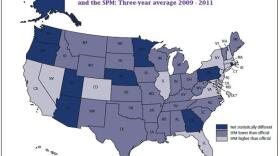A new I-News project provides a revealing portrait of disparities for Colorado’s African American and Latino residents.
The series looks back at five decades of information from the civil rights era to the present, and it shows that things seem to be getting worse where income, education and home ownership are concerned.
Interview highlights:
On how the series originated...
Laura Frank: "We started asking these questions when we began last year getting the results of the 2010 census. Burt Hubbard, who’s a fantastic data analyst, started looking at some of the figures and noticing some really surprising trends. He decided to go back and look at historical data to make some comparisons.
And when he did we saw that gaps in income and education, homeownership – some of the most important measures of social progress – the gaps between whites and African Americans and Latinos had actually grown since the Civil Rights movement. The gaps had been getting smaller right after the 1960s and '70s; but then in the '80s and '90s, those gains began to reverse themselves.
And so that really got to the question of why? It was surprising for a lot of people to see those numbers."
Some key findings...
Burt Hubbard: "Some of the things that really surprised us, for example, [had to do with] incomes, family incomes. Right after the Civil Rights era, both Latino families and Black families in Colorado were making a little bit more than 70 percent of what white families were earning. Today, Latino families are only earning just a little over 50 percent of what white families earn, and for Black families it’s just a little above 60 percent. That’s a huge difference in three or four decades."
How does Colorado compare to other states?
Burt Hubbard: "In many different categories, after the civil rights era, Colorado fared better than most other states. Today in some of those same categories, such as income and college degrees, they now fare a lot worse. The gaps are a lot bigger than most states."
Where do we go from here?
Burt Hubbard: "I think the state probably really needs to look at education. Colorado has fallen from the middle of the pack in funding both K - 12 and higher education, to near the bottom. At the same time, college tuition rates have been going up – and that’s a double whammy for families that are trying to afford to send their kids to college. I think addressing that whole phenomenon, that issue, would do a lot to try to help close these gaps."
Laura Frank: "The thing about this story is that there aren’t obvious, simple solutions, because there aren’t obvious, simple reasons why the gaps are widening again. In the stories we look at some of the issues, we look at policies that affect the economy... we look at changes in family structure, we look at policies that have to do with justice and all kinds of issues. And when you wrap all those together, they help explain some of the growth in the gap.
So I think, really, this series is the start of a conversation for Colorado about what needs to happen next: Why are these gaps growing? What does it mean for all of us, for our own statewide economy, and the moral issues?"






